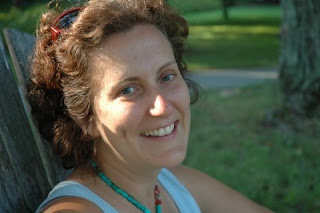today i hopped in the car and drove down to palo alto to present some ideas to librarians in
green library at stanford. the talk was organized by stanford librarian
shinjoung yeo and the
information center.
i seldom give talks about classes that are still in progress but that's what most of my presentation today covered. first, i talked about what my students are doing this semester in
digital journalism. next, i talked about what my students are doing in
digital literacy. my main idea, i think, was to say that instead of librarians and educators thinking about teaching with technology, we should be thinking about learning with technology. put another way, instead of professors and librarians building sites for students to visit and obey, we should encourage our students to build their own sites - sites where they follow their curiosity, create content, converse, and collaborate (the five c's). i closed my talk by gushing about
gleeson gleanings.

i began by discussing my digital journalism students and their tech skills: they blog, they flickr, they comment, they tag. they,
like other young people, create lots and lots of content, some of it really good. i presented our
growing campus map and clicked through some of the pins. i spent considerable time on one pin, the pin over USF's organic garden.

this year at USF,
the garden project - 11 students, 2 profs - has planted an organic farm on campus. last week, i sent out my digital journalism students to cover the garden. today, with the librarians, i focused on one post, miles' USF
Organic Garden Project post, which includes excellent writing, photography, and video, but also includes an inaccuracy. i then noted to the librarians how a garden project student, valeria, commented on miles' blog and corrected the mistake. so: a digital journalism student explores and documents the work of garden project students, and then a garden project student reads over and makes more accurate the work of a digital journalism student. very cool: students teaching students. i call that
campus crowdsourcing.

i then changed gears and talked about the students and happenings in my
digital literacy course. i explained, i think,
the davies forum and the uniqueness of the enrolled students. i also explained that the course includes multiple field trips and some stellar guest speakers including
ivan chew.

i used this photograph to share with the librarians a long, complex, and wonderful story about ivan's visit with the davies forum and one day i'll try to blog about it in detail. but i also used this photograph to explain how my davies forum students are not only creating content. they are organizing content. they are curating content.
to illustrate what i meant by student-generated content and curation, i showed lulu's
Librarians of the Future photo set:

and flickr's
public daviesforum tag:

at this point, time was running short and things got blurry, but i seem to recall saying that i ask my students to log off - to go to a lecture, to attend a concert, to walk around and photograph a garden, to make a delicious meal,
to physically drag your body away from the computer or cell phone and experience something deeply in first life - and then to blog about it. i said to the librarians that i expect all my students, my digital journalism students and my digital literacy students, to
log off before they blog off.
i ended with four reasons why
gleeson gleanings is so cool:
* it's a group blog, collaboratively written by librarians and library staff;
* section/topic bloggers seem to be developing organically;
* blog posts are diverse in terms of length/depth (this is huge in the long run);
* and the best: USF students actually comment on it!
books on shelves vs databases online, authorial credibility vs the wisdom of the crowds, closed journals vs open access, taxonomies vs folksonomies - seems to me that librarians and academics have a lot of concerns and opportunities in common. the more we work together, especially when it comes to curriculum, the smarter and more creative our students become.
thanks green library!




















